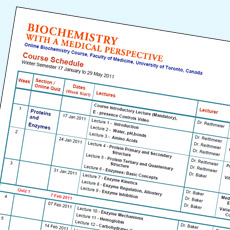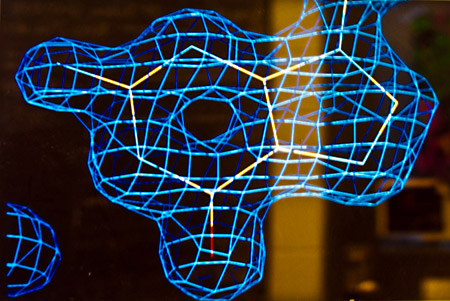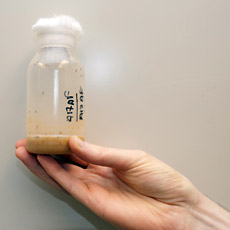Course Content

Download the Lecture List and Schedule (PDF) for a detailed breakdown of the course lectures, quizzes, important dates, and more.
This course introduces the foundations of biochemistry and provides a variety of medical perspectives. The three major subject areas are proteins and enzymes, metabolism, and nucleic acids and biological information flow.
The course will give you an understanding of proteins, the action molecules of the body, how you burn off fat in metabolic pathways during running and the science of bioenergetics in marathons, and how the genetic information stored in your DNA makes you what you are, linking you to your parents, and your children.

Rendering of a nucleotide base bound to a GTPase.
University Level Understanding
This online video course will give you a university level understanding of concepts in biochemistry. The content of the course is equivalent to the University of Toronto courses BCH 210H (Biochemistry I) and BCH 311H (Biochemistry II) and fulfills a full year biochemistry course requirement with 54 hours of illustrated video lectures and accompanying medical perspectives.
The course is taught by experienced faculty members in the Department of Biochemistry in the Faculty of Medicine, University of Toronto. The course has short web - based quizzes and concludes with an invigilated exam in your locality.
Although there are no prerequisites for this course, high school biology and first year university level chemistry are recommended to assist your molecular understanding.
back to topMedical Perspectives
In addition to the 54 hours of video lectures, the course features video articles with medical insights into the biochemistry involved in a variety of diseases.
Some of the current and relevant medical issues to be explored include:
- sickle cell anemia
- lactose intolerance
- hyperglycemia
- scurvy
- Tay Sachs disease
- Cystic Fibrosis
- cholera and whooping cough
Main Areas of Study

Proteins and Enzymes
- nature of bonds in molecules
- characteristics of water, the universal solvent, and pH
- structures and nature of amino acids, building blocks of proteins
- levels of protein structure and protein 3-dimensional shape
- nature of enzyme catalyzed reactions, their regulation, inhibition and mechanisms
- hemoglobin, the oxygen transport protein
- characteristics of carbohydrates found in nature
- structures and nature of fatty acids and lipids found in biological membranes
- structure and functions of membrane proteins: receptors, channels and pumps
Metabolism
- basic concepts of metabolism and bioenergetics
- how glucose fuels running via the glycolysis pathway and mitochondrial oxidation
- building glycogen (polyglucose) reserves following meals
- how glucose is made during prolonged exercise
- how fatty acids serve as fuel in long distance running
- fat catabolism gone awry: diabetes and ketone bodies
- eicosanoids and the biochemistry of inflammation
- how fatty acids, phospholipids and cholesterol are made
- amino acid and nucleotide metabolism
Nucleic Acids and Biological Information Flow
- structures of the information molecules, DNA and RNA
- DNA replication in cell division
- DNA Repair and Recombination
- RNA synthesis
- tRNA and mRNA processing
- genetic code and protein synthesis
- recombinant DNA technology
- CRISPR
Lecture List

Download the Lecture List and Schedule (PDF) for a detailed breakdown of the course lectures, quizzes, important dates, and more.
Download the lecture list and schedule as a PDF for a detailed breakdown of the course lectures, quizzes, important dates, and more.
Lecture 1 - Introduction
Lecture 2 - Water, pH,bonds
Lecture 3 - Amino Acids
Lecture 4 - Protein Primary and Secondary Structure
Lecture 5 - Protein Tertiary and Quaternary Structure
Lecture 6 - Enzymes: Basic Concepts
Lecture 7 - Enzyme Kinetics
Lecture 8 - Enzyme Regulation, Allostery
Lecture 9 - Enzyme Inhibition
Lecture 10 - Enzyme Mechanisms
Lecture 11 - Hemoglobin
Lecture 12 - Carbohydrates One
Lecture 13 - Carbohydrates Two
Lecture 14 - Lipids: Fatty Acids, Membrane Lipids
Lecture 15 - Membrane Structure and Membrane Proteins
Lecture 16 - Membrane Transport
Lecture 17 - Membrane Receptors
Lecture 18 - Metabolism : Basic Concepts
Lecture 19 - Glycolysis
Lecture 20 - Accessing Glucogen Stores
Lecture 21 - Puruvate Dehydrogenase and the Citric Acid Cycle
Lecture 22 - Oxidative Phosphorylation/Electron Transport
Lecture 23 - Oxidative Phosphorylation/Proton Motive Force
Lecture 24 - Glycogen Synthesis
Lecture 25 - Fat Mobilization
Lecture 26 - Fatty Acid Degradation, ATP, Gluconeogenesis
Lecture 27 - Diabetes and Ketone Bodies
Lecture 28 - Discovery of Insulin
Lecture 29 - Fatty Acid and Triacylglycerol Synthesis
Lecutre 30 - Cholesterol Synthesis
Lecture 31 - Lipoproteins
Lecture 32 - Eicosanoids and Inflammation
Lecture 33 - Phospholipid Synthesis
Lecture 34 - Phosphoinositides and Signalling
Lecture 35 - Amino Acid Synthesis
Lecture 36 - Amino Acid Degradation
Lecture 37 - Nucleotide Metabolism
Lecture 38 - Nucleic Acid Structure One
Lecture 39 - Nucleic Acid Structure Two
Lecture 40 - DNA Replication
Lecture 41 - DNA Repair and Recombination
Lecture 42 - RNA synthesis
Lecture 43 - RNA synthesis
Lecture 44 - Gene Expression I
Lecture 45 - Gene Expression II
Lecture 46 - RNA Processing
Lecture 47 - Genetic Code
Lecture 48 - Amino Acids and tRNA
Lecture 49 - Protein Synthesis I
Lecture 50 - Protein Synthesis II
Lecture 51 - Protein Secretion
Lecture 52 - Regulation of Translation
Lecture 53 - Recombinant Technology I
Lecture 54 - Recombinant Technology II










